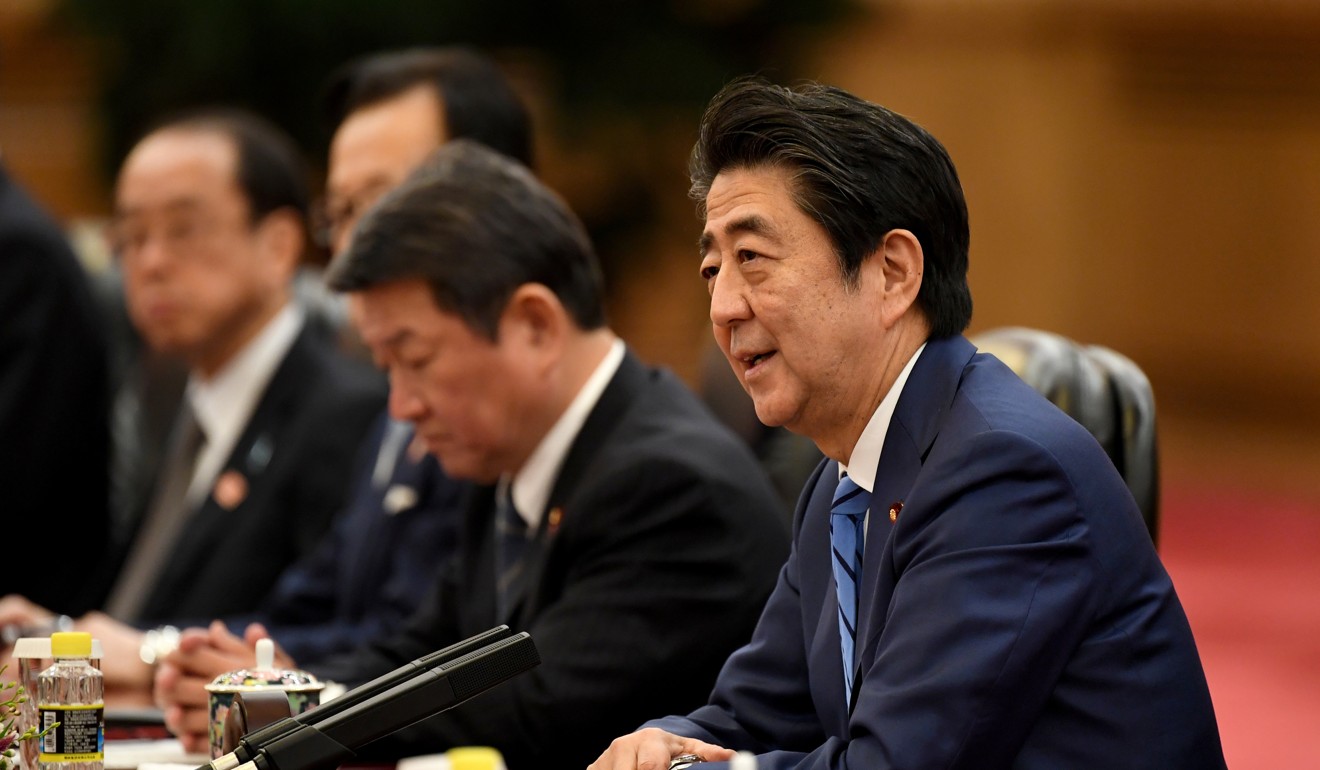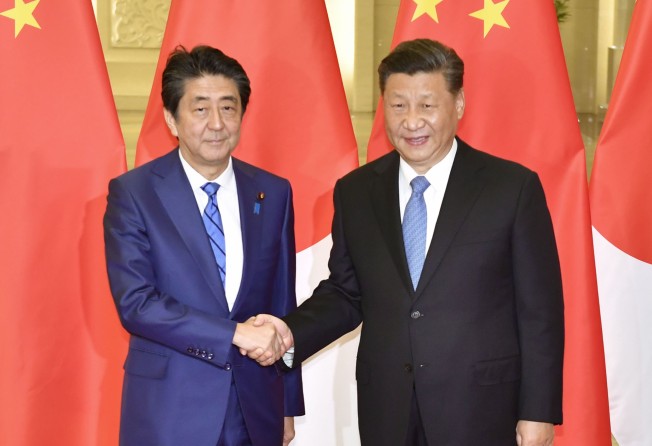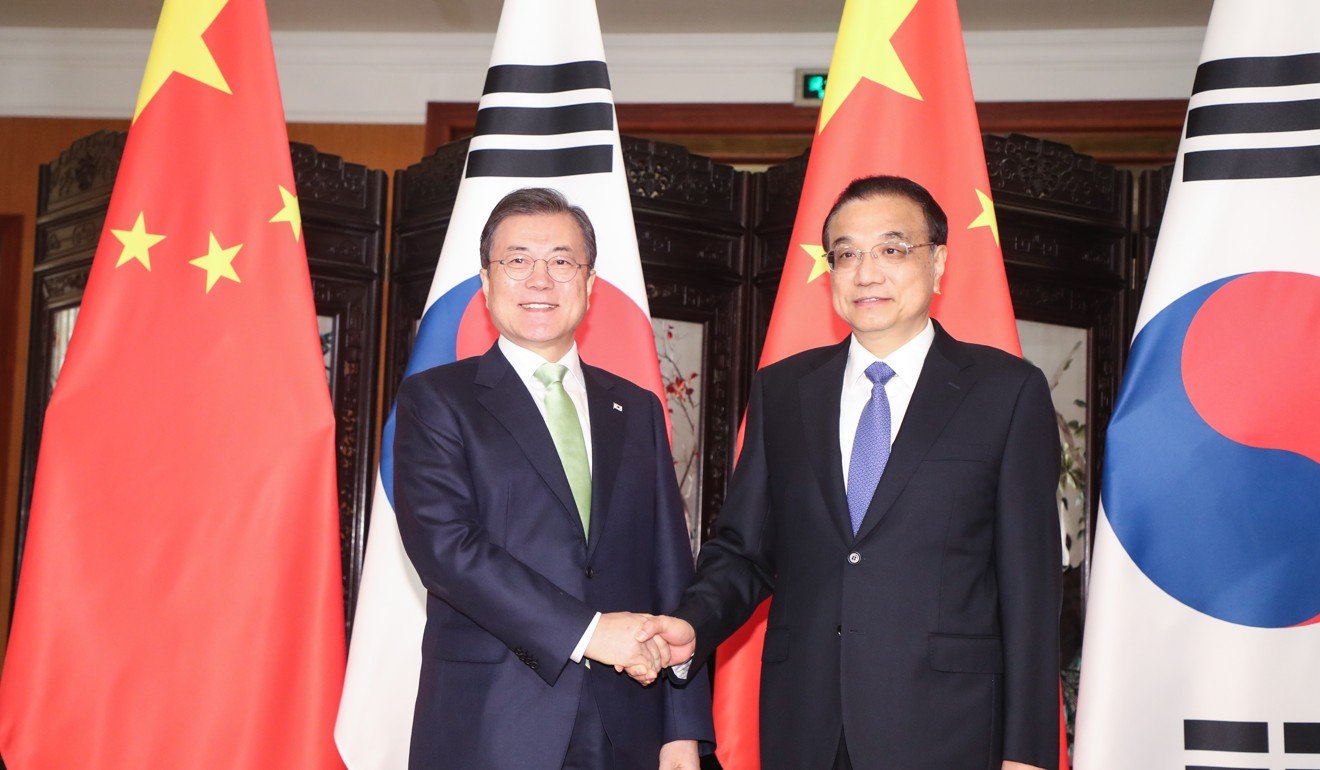
China and Japan should not see each other as a threat, Xi Jinping tells Shinzo Abe
- Chinese president welcomed Japanese prime minister to Beijing as relations between the two sides continue to thaw after years of tension
- While contentious issues such as the East China Sea and Japan’s wartime legacy have been put to one side for now, they have yet to be fully resolved

Chinese President Xi Jinping pledged to elevate ties with the country’s neighbours to a new level on Monday, saying China and Japan should not regard each other as a threat.
In a meeting with Prime Minister Shinzo Abe, Xi said the two sides now had the opportunity to develop things further and that they should continue close communication.
“The world is undergoing significant changes which have never been seen over the past century. The more complicated the situation is, the more we need to stay calm strategically,” Xi said, according to a report by state news agency Xinhua.
Xi said the two nations should step up cooperation and enhance mutual trust to build a security relationship based on the principle of mutual respect, and properly handle sensitive issues.

“This should be fundamental for developing China-Japan relations for the new era, and this should not be blurred and shaken at any time,” Xi said.
“Both nations should stick to the political consensus that China and Japan are cooperative partners but not a threat. In the spirit of ‘turning competition into coordination’, China and Japan will promote the continuous development of bilateral relations along the correct track”.
Abe said he looked forward to Xi’s state visit to Tokyo next year.
This is Abe’s second visit to Beijing over the past two years.
It is also his fourth meeting with Xi since his last visit in October last year, when relations began to thaw after years of tension – prompted by territorial disputes and Japan’s wartime legacy – partly as a result of the pressure from Donald Trump’s trade policies.
During the 45-minute meeting, Abe also urged Beijing to improve its transparency over Xinjiang and continue to exercise restraint over Hong Kong issues.
He called for an early resolution for the ongoing anti-government protests in the city and Xi responded that Hong Kong issue is an internal matter, according to Masato Ohtaka, a spokesperson from the Japanese foreign ministry. It is estimated that around 25,000 Japanese citizens live in Hong Kong.
Xi also met his South Korean counterpart Moon Jae-in, saying both China and South Korea are influential nations.
“We have a wide range of common understandings in various fields, including on further developing bilateral relations, facilitating regional peace, stability and prosperity, and defending multilateralism and a free trade system,” he said.
The deteriorating relationship between China and the United States has pushed Beijing to repair relations with its neighbours.
Relations between China and South Korea were also damaged in recent years after Seoul approved the deployment of the THAAD missile defence system, which China viewed as a threat to its security. The move prompted an unofficial boycott that hit South Korean businesses and entertainment industry and led to a steep decline in tourist numbers.
China is pressing Japan to stay in the Regional Comprehensive Economic Partnership being negotiated with the Association of Southeast Asian Nations (ASEAN) Australia, China, India, Japan, New Zealand and South Korea.
However, Japan has questioned whether it would want to sign up after India threatened to withdraw to protect business from Chinese competition.
In one of its most recent overtures, China, which is facing a severe meat shortage after the outbreak of African swine fever, has lifted a ban on deboned Japanese beef from cows under 30 months old.
The measure, which came into force on Monday, ends a ban on Japanese beef exports that has been in force since a BSE (commonly known as mad cow disease) outbreak in 2001.
China’s Customs Service and Ministry of Agriculture also said that it would allow the import of qualified pork products from Japan imposed after a 2010 foot-and-mouth disease outbreak.
At the meeting, Xi also said China and Japan should jointly launch infrastructure projects in third nations, and cooperate in areas ranging from artificial intelligence to high technology, according to Xinhua.
Abe was guest of honour at a dinner Xi hosted in Beijing on Monday, before the Japanese leader flies to Chengdu, the capital of Sichuan province on Tuesday, where he will join Moon and Chinese Premier Li Keqiang for a three-way summit.
Items on the agenda are expected to include North Korea after Pyongyang threatened to give the US an unwelcome “Christmas gift” unless it makes concessions.
China is also likely to try to mediate in the ongoing trade dispute between Japan and South Korea triggered by a court ruling that Japanese firms must compensate victims of wartime forced labour.

Huang Dahui, a Japanese affairs expert at Renmin University in Beijing, said that both China and Japan would continue to work to improve relations, but warned there was no easy way to resolve issues such as wartime history and the dispute over the Diaoyu Islands, known as the Senkakus in Japan.
Huang also warned that the official efforts to achieve a rapprochement could be hampered by the mutual suspicion that lingers among the citizens of each country.
According to Pew Research Centre’s latest Global Attitudes survey in October, a record 85 per cent of Japanese have an unfavourable opinion of China, the most negative among all the 34 countries surveyed.
In 2018, 78 per cent of Japanese said they held unfavourable views on their neighbour.
Only 14 per cent in Japan said they had a favourable view of China, even though 55 per cent of Japanese said that China’s growing economy was a good thing for their country.
“Relations between China and Japan will continue to improve and develop in the near two or three years because factors affecting bilateral relations are unlikely to change,” Huang said.
“But the long-term future remains gloomy,” Huang said. “Issues like history, the Diaoyu Islands and Taiwan are now under control or have been set aside. But they have not been resolved … so in the long run, bilateral relations may face similar deterioration in the future.”